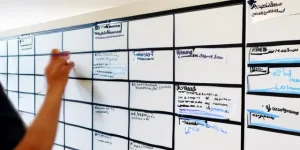Introduction
The role of a research project manager is pivotal. These professionals are responsible for overseeing the planning, execution, and completion of research projects, ensuring that they meet their objectives within the allocated time and budget. They act as the bridge between various stakeholders, including researchers, funding bodies, and administrative staff, facilitating communication and coordination among diverse teams. Their expertise in project management methodologies, combined with a deep understanding of the research process, enables them to navigate the complexities of research projects effectively.
Cross-disciplinary collaboration is a concept that has gained significant traction in recent years. It refers to the integration of knowledge, methods, and perspectives from different academic disciplines to address complex research challenges. This approach encourages researchers to step outside their traditional boundaries and engage with experts from other fields, fostering an environment of innovation and creativity. By leveraging diverse skill sets and viewpoints, cross-disciplinary collaboration can lead to more comprehensive solutions and a deeper understanding of multifaceted issues.
The significance of collaboration in research cannot be overstated. Collaborative efforts often result in improved research outcomes, as they allow for the pooling of resources, sharing of knowledge, and enhancement of creativity. When researchers from different disciplines come together, they can tackle problems from multiple angles, leading to more robust findings and impactful results. Furthermore, such collaborations can enhance the credibility of research projects, as they often involve a wider range of expertise and perspectives, making the outcomes more reliable and applicable in real-world scenarios. Ultimately, fostering a culture of cross-disciplinary collaboration is essential for research project managers and academics alike, as it not only enriches the research process but also contributes to the advancement of knowledge across various fields.
The Benefits of Cross-Disciplinary Collaboration
Cross-disciplinary collaboration has emerged as a vital strategy in the realm of research project management, particularly for those seeking to enhance the outcomes of their projects. By bringing together experts from various fields, research project managers can leverage a multitude of benefits that significantly contribute to the success of their initiatives. Here are some key advantages:
- Increased Innovation and Creativity: Collaborating across different disciplines fosters an environment where diverse perspectives can converge. This amalgamation of ideas often leads to innovative solutions that may not have been conceived within a single discipline. The integration of varied insights can spark creativity, resulting in groundbreaking research outcomes that address complex challenges more effectively [1][6].
- Enhanced Problem-Solving Capabilities: Cross-disciplinary teams are equipped to tackle multifaceted problems by integrating expertise from various fields. This collaborative approach allows for a more comprehensive analysis of issues, ensuring that all angles are considered. As a result, teams can devise more effective and holistic solutions to the challenges they face [5][11].
- Improved Resource Sharing: Engaging in cross-disciplinary collaboration enables research project managers to access a broader range of tools, methodologies, and resources. By pooling resources from different disciplines, teams can enhance their research capabilities and efficiency. This sharing of knowledge and tools not only optimizes the research process but also enriches the overall project outcomes [4][15].
- Higher Chances of Funding and Support: Interdisciplinary research projects often attract more attention from funding bodies, as they address complex, real-world issues that require collaborative solutions. Granting agencies are increasingly looking to support projects that demonstrate cross-disciplinary collaboration, recognizing its potential to yield significant advancements in knowledge and practice. This can lead to increased funding opportunities and support for research initiatives [3][11].
Identifying Opportunities for Collaboration
Fostering cross-disciplinary collaboration is essential for enhancing project outcomes. Research project managers play a pivotal role in identifying and facilitating these collaborative opportunities. Here are some key strategies to consider:
- Assessing Existing Research Networks and Communities: Begin by evaluating the current research networks and communities within your institution and beyond. This involves mapping out existing collaborations and identifying gaps where new partnerships could be beneficial. Engaging with established networks can provide insights into potential collaborators who share similar research interests or complementary expertise. This approach not only enhances the scope of research but also builds a foundation for future collaborations [1][4].
- Utilizing Academic Conferences and Workshops: Academic conferences and workshops serve as excellent venues for meeting potential collaborators. These events bring together researchers from various disciplines, providing a platform for networking and exchanging ideas. Actively participating in discussions, presenting your work, and attending sessions outside your primary field can help you identify individuals or groups with whom you can collaborate. Such interactions often lead to innovative ideas and partnerships that might not have been considered otherwise [2][3].
- Engaging with Industry Partners for Applied Research Opportunities: Collaborating with industry partners can significantly enhance the practical impact of research projects. Research project managers should seek out opportunities to engage with businesses and organizations that align with their research goals. This can involve joint research initiatives, internships, or consultancy projects that not only provide funding but also access to real-world challenges that can inform academic research. Building these relationships can lead to mutually beneficial outcomes, where academic insights drive industry innovation and vice versa [5][11].
- Leveraging Social Media and Online Platforms for Outreach: In today’s digital age, social media and online platforms are invaluable tools for outreach and collaboration. Research project managers can utilize platforms like LinkedIn, ResearchGate, and Twitter to connect with researchers across disciplines. Sharing research findings, engaging in discussions, and participating in online forums can help identify potential collaborators who are interested in similar topics. Additionally, these platforms can facilitate the dissemination of collaborative opportunities, making it easier for researchers to find partners for their projects [8][11].
By implementing these strategies, research project managers can effectively identify and cultivate collaboration opportunities that enhance the quality and impact of their research projects. Emphasizing cross-disciplinary collaboration not only enriches the research process but also leads to innovative solutions that address complex challenges in today’s world.
Best Practices for Managing Cross-Disciplinary Teams
Managing cross-disciplinary research teams presents unique challenges and opportunities. To foster collaboration across different fields and improve project outcomes, research project managers can implement several best practices:
- Establish Clear Communication Channels and Protocols: Effective communication is crucial in cross-disciplinary teams. Utilizing a mixture of communication methods—such as big group discussions for coherence and smaller working groups for focused tasks—can enhance understanding and collaboration among team members. This approach ensures that everyone is on the same page regarding project goals and expectations, which is vital for maintaining alignment and productivity [5][2].
- Define Roles and Responsibilities: Clearly delineating roles and responsibilities helps to avoid confusion and overlap in tasks. This clarity is essential for building a successful collaborative environment, as it allows team members to understand their contributions and how they fit into the larger project framework. Establishing authorship norms and task designations can further streamline processes and enhance accountability within the team [6][4].
- Encourage an Open-Minded Culture: Fostering a culture that respects and values diverse viewpoints is essential for cross-disciplinary collaboration. Encouraging team members to share their perspectives and expertise can lead to innovative solutions and a more comprehensive understanding of complex research problems. This open-mindedness can be cultivated through team-building activities and reflexivity training, which promote awareness of each member’s unique contributions [1][2].
- Regularly Evaluate Team Dynamics: Continuous assessment of team dynamics is crucial for identifying and addressing conflicts promptly. Regular check-ins and feedback sessions can help project managers gauge the team’s morale and collaboration effectiveness. By addressing issues as they arise, managers can maintain a positive working environment and ensure that the team remains focused on their shared objectives [3][2].
By implementing these best practices, research project managers can effectively navigate the complexities of cross-disciplinary collaboration, ultimately leading to improved research outcomes and a more cohesive team environment.
Tools and Techniques to Facilitate Collaboration
Fostering cross-disciplinary collaboration is essential for achieving innovative outcomes. By leveraging the right tools and techniques, research project managers can enhance teamwork and streamline communication across various fields. Here are some key tools that can significantly aid in facilitating collaboration:
- Project Management Software: Tools like Trello and Asana are invaluable for managing tasks and timelines in collaborative research projects. These platforms allow teams to create boards, assign tasks, set deadlines, and track progress, ensuring that all members are aligned and accountable. This structured approach helps in breaking down complex projects into manageable components, making it easier for diverse teams to work together effectively.
- Collaborative Research Platforms: Platforms such as ResearchGate and Mendeley provide researchers with the ability to share publications, collaborate on projects, and connect with peers across disciplines. These platforms not only facilitate the exchange of ideas and resources but also help in building a community of researchers who can support each other’s work, thus enhancing the overall quality of research outputs.
- Virtual Communication Tools: In an increasingly remote work environment, tools like Zoom and Slack have become essential for maintaining effective communication among team members. Zoom allows for face-to-face meetings, which can foster a sense of connection and collaboration, while Slack provides a platform for real-time messaging and file sharing. These tools help bridge the gap between different disciplines, enabling researchers to discuss ideas, share feedback, and resolve issues promptly.
- Document Sharing and Version Control Systems: Utilizing systems like Google Drive and GitHub is crucial for managing documents and ensuring that all team members have access to the latest versions of research materials. Google Drive allows for easy sharing and collaborative editing of documents, while GitHub is particularly useful for managing code and data in research projects. These tools help maintain organization and clarity, reducing the risk of miscommunication and errors in collaborative efforts.
By integrating these tools into their workflows, research project managers can create a more cohesive and productive environment for cross-disciplinary collaboration. This not only enhances the efficiency of research projects but also leads to more innovative and impactful outcomes, ultimately benefiting the broader academic and scientific communities.
Case Studies: Successful Cross-Disciplinary Research Projects
Cross-disciplinary collaboration has emerged as a vital strategy in enhancing the effectiveness and outcomes of research projects. By integrating diverse expertise and perspectives, research project managers can lead initiatives that not only address complex problems but also foster innovation. Below are notable examples of successful interdisciplinary projects, along with insights into the roles of research project managers and the lessons learned from these collaborations.
Notable Interdisciplinary Projects and Their Outcomes
- Bird and Bat Conservation Initiatives: Various research projects focused on bird and bat conservation have demonstrated the benefits of cross-disciplinary approaches. These projects have successfully implemented conservation measures across different regions, leading to improved biodiversity outcomes. The collaboration between ecologists, environmental scientists, and policy makers has been crucial in developing effective strategies that are both scientifically sound and practically applicable [1].
- Antimicrobial Use and Animal Health: A project examining antimicrobial use in veterinary medicine showcased how the integration of veterinary science, public health, and environmental studies can lead to innovative solutions. By employing the CK theory, researchers were able to develop novel cross-disciplinary projects that addressed the complexities of antimicrobial resistance, highlighting the importance of collaboration in tackling global health issues [4].
- Math-Science Research Linkages: Case studies linking mathematics and science have provided compelling evidence of the synergistic benefits of interdisciplinary research. These projects have not only advanced scientific understanding but also improved educational outcomes by fostering a collaborative learning environment among students and researchers from different fields [14].
Roles of Research Project Managers in Successful Collaborations
Research project managers play a pivotal role in facilitating cross-disciplinary collaborations. Their responsibilities include:
- Coordination and Communication: They ensure effective communication among team members from various disciplines, helping to bridge gaps in understanding and fostering a collaborative culture.
- Resource Management: Project managers are responsible for securing funding and resources, often leveraging institutional seed money to initiate projects. This funding flexibility is crucial for enabling early-career researchers to take on leadership roles [11].
- Mentorship and Empowerment: By mentoring early-career researchers, project managers can cultivate a new generation of interdisciplinary leaders who can navigate the complexities of collaborative research [5].
Lessons Learned and Best Practices
From the analysis of successful cross-disciplinary projects, several key lessons and best practices have emerged:
- Emphasize Shared Goals: Establishing common objectives among diverse team members is essential for fostering collaboration. This alignment helps to maintain focus and drive collective efforts toward achieving project outcomes.
- Encourage Open Dialogue: Creating an environment where team members feel comfortable sharing ideas and feedback can enhance creativity and innovation. Regular meetings and collaborative platforms can facilitate this open communication.
- Invest in Training and Development: Providing training opportunities for researchers to develop cross-disciplinary skills can enhance collaboration. This includes workshops on communication, project management, and interdisciplinary research methodologies.
Challenges of Cross-Disciplinary Collaboration
Cross-disciplinary collaboration in research projects can lead to innovative solutions and enhanced outcomes. However, it also presents several challenges that research project managers must navigate effectively. Here are some key obstacles and strategies to overcome them:
- Differences in Terminology and Conceptual Frameworks: Each discipline has its own language and theoretical frameworks, which can lead to misunderstandings and miscommunications among team members. To address this, it is essential to establish a common vocabulary and ensure that all participants have a clear understanding of each other’s concepts and methodologies. Regular workshops or meetings can facilitate this process, allowing team members to share their perspectives and clarify any ambiguities [6][11].
- Time Management Issues: Collaborators from different fields often have varying schedules, priorities, and commitments, which can complicate project timelines. To mitigate this challenge, project managers should implement flexible scheduling and prioritize regular check-ins to keep everyone aligned. Utilizing project management tools that allow for shared calendars and task tracking can also help in coordinating efforts and ensuring that deadlines are met [8][12].
- Navigating Institutional Bureaucracy and Funding Limitations: Institutional policies and funding constraints can pose significant barriers to cross-disciplinary research. Project managers should familiarize themselves with the specific regulations and funding opportunities relevant to their project. Building relationships with administrative staff and seeking guidance from experienced colleagues can provide valuable insights into navigating these bureaucratic hurdles. Additionally, exploring alternative funding sources, such as grants specifically aimed at interdisciplinary research, can help alleviate financial pressures [4][6].
- Building Trust and Rapport Among Team Members: Trust is a critical component of successful collaboration, especially in diverse teams. Research project managers should foster an inclusive environment where all team members feel valued and respected. This can be achieved through team-building activities, open communication channels, and encouraging feedback. Establishing clear roles and responsibilities can also help in building accountability and trust among team members from different backgrounds [4][15].
By acknowledging these challenges and implementing strategies to overcome them, research project managers can enhance collaboration across disciplines, ultimately leading to more successful research outcomes.
Conclusion
Cross-disciplinary collaboration emerges as a pivotal strategy for enhancing project outcomes. Throughout this discussion, we have highlighted several key benefits and best practices that underscore the importance of integrating diverse perspectives and expertise.
- Benefits of Cross-Disciplinary Collaboration: Engaging with professionals from various fields not only enriches the research process but also fosters innovation. By bringing together different viewpoints, research project managers can tackle complex problems more effectively, leading to more comprehensive solutions and groundbreaking discoveries. This collaborative approach can significantly enhance the quality and impact of research outcomes.
- Best Practices for Collaboration: To maximize the advantages of cross-disciplinary work, research project managers should implement best practices such as establishing clear communication channels, setting shared goals, and creating an inclusive environment that values each discipline’s contributions. Regular meetings and collaborative tools can facilitate ongoing dialogue and ensure that all team members are aligned and engaged.
- Encouragement for Active Engagement: Research project managers are encouraged to actively seek out cross-disciplinary opportunities. This can involve forming partnerships with other departments, institutions, or even industries that complement their research focus. By doing so, they can leverage a broader range of skills and knowledge, ultimately leading to more robust research outcomes.
In conclusion, embracing cross-disciplinary collaboration is not just beneficial; it is essential for the advancement of research. By working together across fields, research project managers can unlock new potentials and create impactful solutions that address the challenges of today and tomorrow.
Find out more about Shaun Stoltz https://www.shaunstoltz.com/about/.
This post was written by an AI and reviewed/edited by a human.



